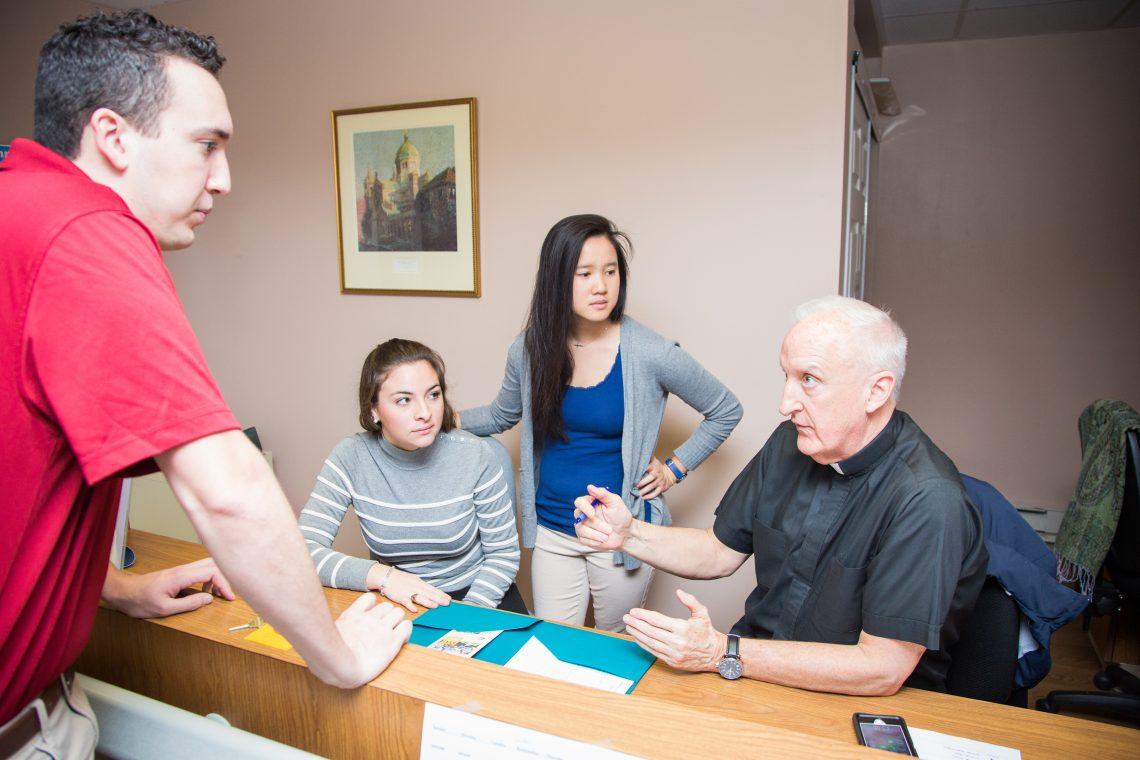Institute looks to reshape addiction training and treatment
More than 1,200 people died from drug overdoses in Philadelphia in 2017, according to estimates from the Mayor’s Opioid Task Force. This death rate is motivating the Institute of Clinical Bioethics (ICB) to take action through research of safe injection sites.
Peter Clark, S.J., Ph.D. professor of medical ethics at St. Joe’s, is leading a team of researchers that include three St. Joe’s undergraduate students in the ICB, two medical residents at Mercy Health and four medical students at Philadelphia College of Osteopathic Medicine (PCOM). The team is preparing a research paper that will, in part, provide specific recommendations to the city of Philadelphia on how to open and operate a safe injection site effectively.
One of the ultimate goals of the project is to provide the groundwork for establishing a Center for Addiction at St. Joe’s.
“There are some benefactors who are in discussion with the administration about possibly starting a Center for Addiction that would come under the Institute of Bioethics.” Clark said. “The center would be three pronged – focusing on education, research and public policy of addiction.”
Philadelphia has become the epicenter of this drug crisis, according to Sonul Gulati M.D., a resident at Mercy Catholic Medical Center who is examining the medical implications of the opioid epidemic as part of the research project.
“Though the city has tried its hand in a number of different ways at battling this intractable issue, it has failed as the number of drug-related deaths and infections here are rising in alarming numbers,” Gulati said.
The 1,200 opioid overdose deaths are four times the number of homicides in Philadelphia in 2017, according to the Philadelphia Police Department. Fentanyl, a synthetic opiate, has been responsible in large part for the rapid increase in opioid overdose deaths. As a result, city officials are looking for new tactics to combat what has become the deadliest drug crisis in U.S. history.
District Attorney Larry Krasner, Mayor Jim Kenney and healthcare commissioner Thomas Farley are all in favor of making Philadelphia the first city in the U.S. to provide safe injections. The site would allow users to come to a facility and inject with clean needles while medical professionals carefully monitor their health.
This harm reduction approach aims to prevent the spread of disease and reduce overdose deaths as well as provide services to connect users with rehab specialists.
Sam Schadt ’14, now a medical student at PCOM, has been researching a safe injection site called Insite that has been operating in Vancouver, Canada since 2003. Schadt and the research team are examining Insite to see how a similar site might work in Philadelphia.
“They’ve seen thousands and thousands of heroin addicts that come in and out and there have been multiple heroin addicts that have actually overdosed in the clinic, however no one has died,” Schadt said. “And it’s an opportunity for people to face their habit one-on-one because these clinics are staffed with healthcare workers as well as psychiatrics.”
Despite support from government officials in Philadelphia, the practice of giving users a space to inject heroin and other opioids is controversial, according to Schadt.
“You’re allowing people to inject themselves with an illegal drug, a scheduled class one drug,” Schadt said. “But, if you look at the grand scheme of things, of what they’re doing in Vancouver, they’re saving a lot of money and they’re saving a lot of people’s lives. So we are looking at that as a way to model a potential pilot project at St. Joe’s.”
The research team plans for their paper to include a cost-benefit analysis of safe injection sites in Philadelphia. They are also examining how medical education can play a role in addressing the opioid epidemic and addiction as a whole.
“This isn’t going to be corrected until we train new physicians in medical school, train the residents and even train the undergraduates,” Clark said. “Unless we address this issue educationally and practically through protocols, we’re not going to go anywhere with this – it’s only going to get worse.”
Training on addiction has been a missing part of medical education, according to Schadt.
“I didn’t receive any classes on pain management and I didn’t receive any education on addiction and specifically any information about the opioid epidemic,” Schadt said.
While the education of future doctors is a focus, Clark and his team want to find a way to respond to the current opioid crisis.
Clark said he knows the recommendations of their research study might be controversial and expects pushback.
“I think it’s going to create chaos,” Clark said. “I presume we’re going to propose yes for the safe injection sites and that’s going to anger a lot of people. ‘How can a Catholic institution have these people proposing this?’ I think it at least will start the dialogue.”
Clark, a Jesuit and an ethics professor, said he is “willing to take the battle” for safe injection sites amidst concerns from some catholic conservatives and other skeptics.
“They’re going to have to listen to the facts. So I think our job is to present the facts on it,” Clark said. “If you truly believe life is sacred – we have the highest death rates due to opioids in the country – so why wouldn’t we try whatever we need to try in order to solve these issues?”



































